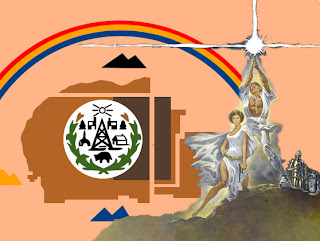 The Navajo Nation Museum has been collaborating with Lucasfilm to translate the first Star Wars movie into Diné bizaad: a language currently spoken by nearly a quarter-million people, most of whom live throughout the American southwest. And if you speak fluent Navajo you'll have a chance to get in on the action because auditions are slated to start later this week at the museum in Window Rock, Arizona. For now everything about the Navajo script is being held close to vest (even the title, which TIME.com speculates could be Sǫʼ Baaʼ). The classic phrase "May the Force be with you" could translate into "May you walk with great Power", or many other possible permutations. It's much the same issue that was confronted by the Navajo code talkers who served in the American armed forces during World War II: there were no direct Navajo words for guns, bombs etc. so those became "tapes" and "eggs". Australia became "Rolled Hat" after that country's signature headwear, and America was called "Our Mother".
The Navajo Nation Museum has been collaborating with Lucasfilm to translate the first Star Wars movie into Diné bizaad: a language currently spoken by nearly a quarter-million people, most of whom live throughout the American southwest. And if you speak fluent Navajo you'll have a chance to get in on the action because auditions are slated to start later this week at the museum in Window Rock, Arizona. For now everything about the Navajo script is being held close to vest (even the title, which TIME.com speculates could be Sǫʼ Baaʼ). The classic phrase "May the Force be with you" could translate into "May you walk with great Power", or many other possible permutations. It's much the same issue that was confronted by the Navajo code talkers who served in the American armed forces during World War II: there were no direct Navajo words for guns, bombs etc. so those became "tapes" and "eggs". Australia became "Rolled Hat" after that country's signature headwear, and America was called "Our Mother".So... how is terminology like "lightsaber", "hyperdrive" and "Grand Moff" going to work out in Diné bizaad? Apparently the staff at the Navajo Nation Museum and the crew at Lucasfilm have figured it all out.
The entire effort is being called an "entertaining and educational" project toward preserving the Navajo language for future generations. Maybe even a fun way for those who don't speak Navajo but who do know the Star Wars movies verbatim (raising hand here) to learn an indigenous American tongue! Hey who knows: maybe next there can be a dubbing of a Star Wars movie into Aniyawiya for those of us who are Tsalagi or part Tsalagi (more commonly known as the Cherokee :-)
Very big thanks to Tilly Godbudak for finding this great story!








0 comments:
Post a Comment